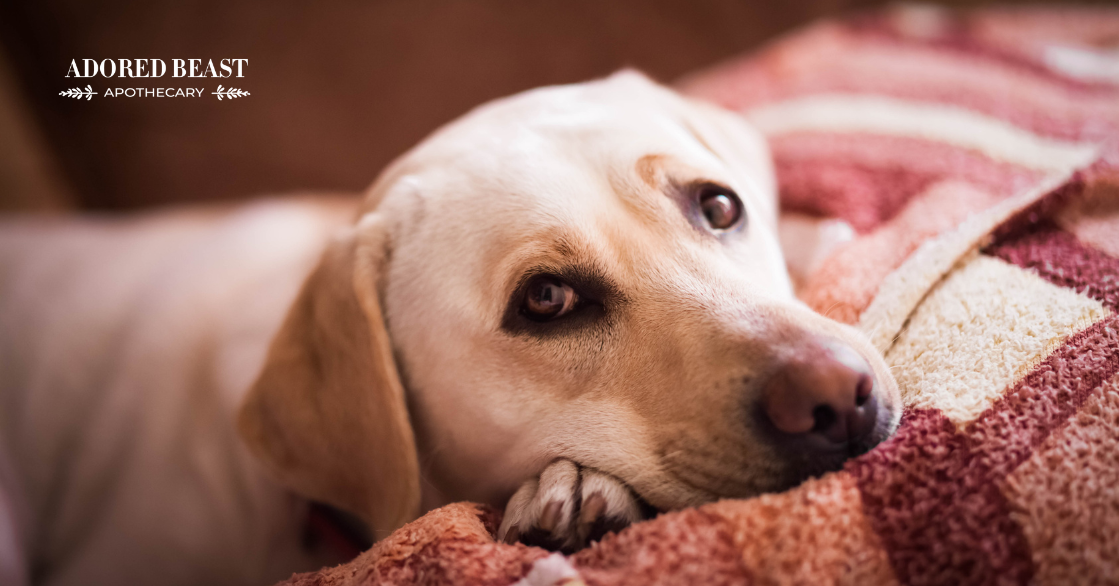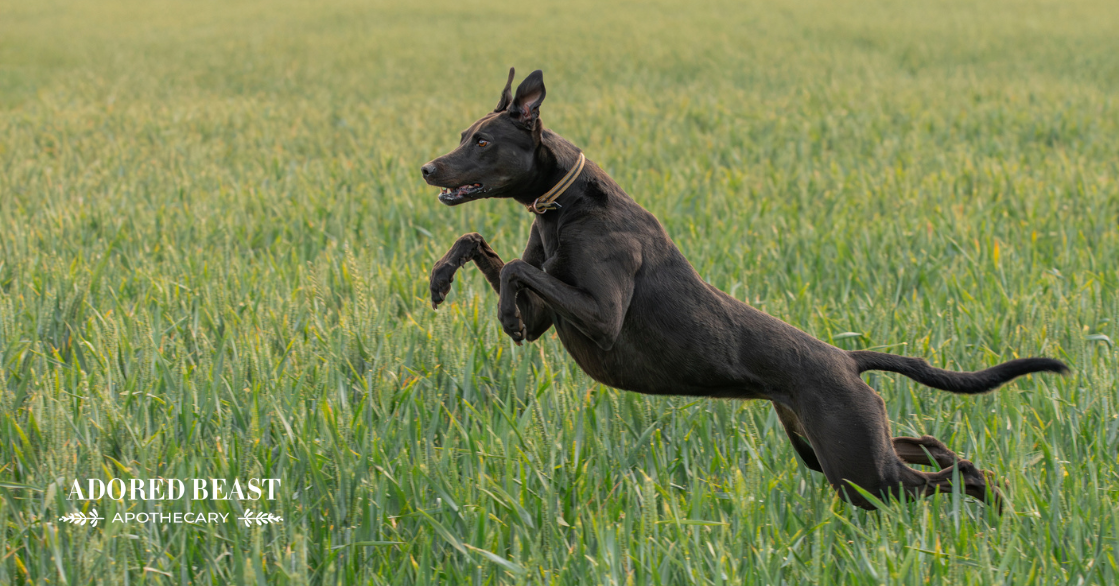When I had my holistic animal hospital, I saw many, many cases of inflammatory bowel disease. Dogs would come in with major digestive issues, and we would have to get down to the root cause. Many times – that cause was IBD.
Thankfully, successful management of IBD in dogs is very possible. Of the hundreds of cases of inflammatory bowel disease I’ve worked with over 30 years, many of those animals have been symptom-free for their lifetime.
And with those who had symptoms return, we were able to navigate their management to provide an incredible quality of life and proactively derail future episodes.
But first, let’s talk about exactly what it is, and what’s causing this condition in the first place?
What is IBD in Dogs?
Just as with humans, IBD in dogs is a syndrome rather than a disease. It’s a group of disorders that result in symptoms such as diarrhea and vomiting (the two most common), which are actually a reaction to chronic irritation in the gut. In addition to causing vomiting and diarrhea, this inflammation can traumatize the mucosal lining of your dog’s gut and interfere with the ability to digest and absorb nutrients. This then turns into a myriad of nutrient disorders and diseases.
Remember: the gut microbiome is the community of friendly and unfriendly bacteria in the gut.
Animals can have a poor microbiome from birth if the mother has a compromised or unhealthy microbiome herself, or if she has a low diversity of bacteria.
If an animal lacks this bacteria when they’re born, this often sets them up for leaky gut and chronic systemic inflammation at a really early age.
There are lots of other causes that are often attributed to its development, including:
- Dietary Sensitivities: Certain ingredients in commercial foods may trigger an inflammatory response.
- Allergies: Dogs can develop allergies to specific proteins or ingredients in their diet.
- Immune System Dysfunction: An overactive immune system may contribute to chronic inflammation in the gastrointestinal tract.
- Stress and boredom: Environmental stressors, changes, or a history of trauma can contribute to the onset of IBD. Boredom can lead to stress, and these can exacerbate symptoms.
- Toxins: toxins in your dog’s environment can damage the microbiome and play a role in irritation.
How to Manage IBD
There are several things to consider when it comes to helping manage IBD.
1. Focus on the Gut
My main way of working with IBD is targeting the gut and the integrity of the mucosal lining and looking at supporting all the related systems of the body. This includes the liver, pancreas, kidneys, immune system, the brain, mental health, and more. You want to decrease the inflammation and repopulate the correct bacteria of the gut. Probiotics and natural anti-inflammatories (I’ll cover in a few minutes) play a major role in this!
Additionally, a unique way in which I managed these cases at my clinic was to try and reduce the thickening and scarring we see with IBD and in leaky gut. This scarring can continue to cause major health issues, including malabsorption of food, etc. I did this using specific homeopathic remedies (porcine cartilage, calendula officinalis, thiosinaminum, and arnica). These are all found in our Gut Seal, available in our Leaky Gut Protocol.
2. Look at the Diet
A species-appropriate raw diet is always what I ideally would like to see all animals on. However, I have seen many animals that cannot tolerate raw food in the beginning, especially those on immunosuppressive drugs like steroids. In these cases, I started with lightly seared or cooked food, and then very, very slowly switched to raw. Some older animals had to stay on slightly cooked food indefinitely, and still thrived and lived out their lives relatively symptom free.
Tracking any dietary triggers is very important, and if you know certain foods seem to cause a flare-up, remove those from the menu.
One thing we recommend staying away from is kibble. Kibble is very dry, and moisture-depleted diets are a huge detriment to your pet’s overall health. The chronic long-term dehydration that comes from eating a dry diet puts your animal (especially cats) at risk for the development of chronic kidney disease. It can also lead to diabetes and chronic pancreatitis in both dogs and cats. Animals who eat a moisture-depleted diet may also be at a much higher risk for urinary tract and bladder issues, because dry diets often just don’t contain the level of moisture required to keep the urinary system healthy and can negatively affect the pH balance of the urine.
3. Keep a Journal
A huge part of this healing journey and managing IBD is keeping a journal to see triggers and EARLY signs. These can include:
- licking their feet
- gulping
- stretching
- arching their backs
- not wanting to eat or being ravenous
- hiding
- lethargic or just not as energetic
- not pooping for a day or just ever so slightly soft stool
- cats over-grooming and pulling out their hair
This way you can get ahead of the big blow ups. Keep homeopathics on hand. In addition, if they get into something you know will cause a flare-up, then you can start these remedies ahead of time to try and derail it. More often than not it at least makes the symptoms much less severe.
Make sure that you also mark down the dates so that you can assess flare-ups and what might be causing them. For example, are they only happening on Tuesdays? What happens on a Tuesday? Are they left alone by themselves? Do they go to daycare? Is there an emotional element? OR, is it that you’re feeding a specific protein on Tuesdays and that could be the catalyst? Writing down dates will help you better analyze cause and effect.
4. Homeopathic Remedies
Remedies:
- Aconite 200C
- Arnica 200C
- Arsenicum 30C
- Iris 30C
- Phosphorus 30C
- Nux vomica 30C
These remedies are the main remedies that I used in my clinic. The nice thing about them is they can be used at any stage.
- Stage 1: Symptomatic but not diagnosed: The jury is out if they actually have IBD.
- Stage 2: Has to be medicated when they go through acute episodes of IBD.
- Stage 3: If your animal is under veterinary care and receiving immune suppressing drugs, antibiotics on a chronic, regular level, on special vet food, showing signs of losing weight…
The cool thing is, at any stage, or with any treatment, homeopathy can be given without a concern.
In stage 1, you can start these remedies in an attempt to derail any symptoms. Use every half hour, 3 times, then every hour 3 times, then 3 times a day until symptoms resolve. Of course, also incorporate the other protocols (diet, anti-inflammatories) right now!
In stage 2, if you use these remedies, often your animal won’t need to be medicated. Use every half hour, 3 times, then every hour 3 times, then 3 times a day until symptoms resolve. Additionally incorporating the other protocols outlined above and below, hopefully that will help to mitigate the episodes.
In stage 3, you can give these remedies 3 times a day and start to ask your vet about starting to incorporate all of the things in this presentation (diet, anti-inflammatories, etc.) with the hope that you will be able to reduce the drugs and your pet will remain asymptomatic.
What Supplements are Helpful for Dogs with IBD?
Prebiotics
Prebiotics feed probiotics. Look for ones with a LOW sugar index and ones that have an affinity for immune modulation (like larch, turkey tail, and chlorella). They feed the bacteria AND have functional values to support healing, inflammation and immune modulation. These are vital when addressing IBD!
***Immune modulation = balancing out the immune system. So, for example, if the immune system goes too high, it helps to bring it down. Or, if it goes too low, it helps to bring it back up.
Probiotics
Probiotics support the gut and repopulate the beneficial communities of bacteria. Find the most diverse strains of probiotics you can. Look for these characteristics:
- ones with science-backed studies that show they can survive in the acidity of a dog’s GI (which is very different to humans)
- that they can defend and inhibit dangerous pathogenic bacteria from over-taking the gut
- they support immune modulation (species-oriented like Fido’s Flora and The Wolf ). This can help to decrease inflammation and support healthy junctions.
Natural Anti-inflammatories
You want to decrease the inflammation in the gut, so for the mucosal lining (part of the bowel which becomes chronically inflamed with IBD), go with:
- NAG (N-acetyl Glucosamine)! Like glucosamine for joints – it works its magic on smooth muscle and the mucosal lining
- Aloe (for dogs, not kitties)
- Slippery elm to increase healthy mucus
- Marshmallow root to soothe
- Licorice root to increase lubrication – the smoother the better
**Our Gut Soothe contains all of these ingredients.
Phytoplankton
Phytoplankton is functional whole food nutrition that’s easily absorbed by the body. Its cell is smaller than a red blood cell and easy to digest. This is important because malabsorption is a huge part of the merry-go-round of IBD and phytoplankton is cell-to-cell nutrition – it’s completely bioavailable – which means it doesn’t need to be digested and absorbed by the GI tract. It also contains the king of antioxidants, superoxide dismutase. (Antioxidants fight free radicals that create oxidative stress and chronic inflammation.) Our Vital Defense is a powerful combination of phytoplankton and chaga mushrooms!
Omega-3 Fatty Acids
Omegas are also good for IBD. They can have anti-inflammatory effects and support overall wellness. Our Potent-Sea is a sustainable, earth-friendly option that doesn’t harm the oceans.
Digestive Enzymes
These can be helpful too. Just go slow with enzymes. IBD is different than straight leaky gut, and enzymes can be too powerful until the body has started to come back into homeostasis (when symptoms have improved by at least 50%). Once they have 50% improvement, start by only giving 1/4 of the recommended dose. Then, as symptoms improve, around the 75% mark, go to half the recommended dose and work up to the full dose at 100%.
Using the Leaky Gut Protocol with IBD
Hands down, the best thing we have to start working on IBD is the Leaky Gut Protocol. It is very, very focused on helping to heal and decrease inflammation in the mucosal lining of the GI tract.
One of the coolest things about it is that it includes the remedies mentioned for scarring above (in Gut Seal) and liver and organ support thanks to the antiinflammatory herbs in Liver Tonic. So it isn’t just supporting the gut, it’s giving some incredibly valuable TLC to all the interconnected parts of the body.
But, just remember, if you do choose to use the Leaky Gut Protocol, follow the Healthy Gut recommendations I just spoke about – starting slowly and working up to the full recommended amount over a period of time, as the body heals.
IBD can be scary to deal with, but it’s something that responds extremely well to an integrative approach. If your pup has recently been diagnosed with IBD, or even if you just suspect it, there is a huge chance that your pup can live symptom free for life if the disease is caught early. If your dog has had years of IBD symptoms, and been on drugs for a long time, there are still many things that you can do to help them live a thriving life and derail symptoms before they rear their ugly head. You can help your dog live a long, healthy, happy life. Never ever forget, there is always hope! <3












